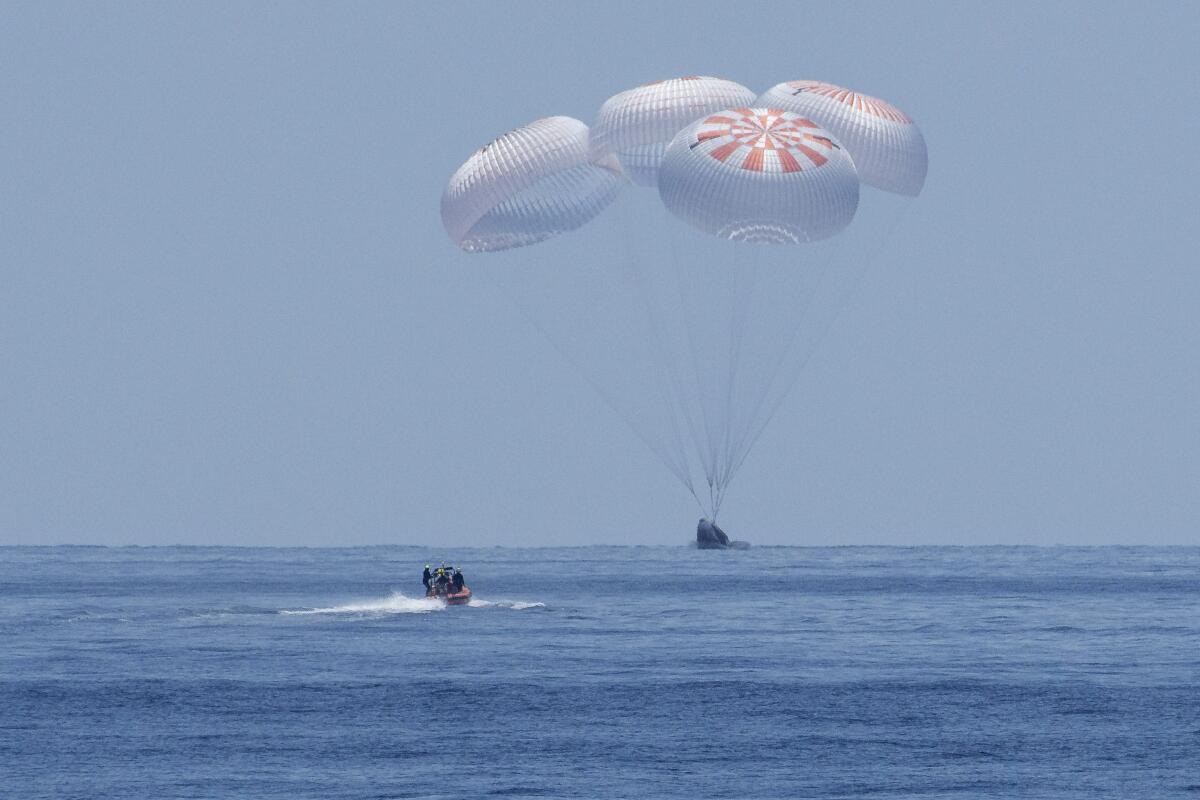SpaceX upgrades Crew Dragon capsule before its next astronaut flight

SpaceX has made some changes to its signature crew spacecraft, the Crew Dragon capsule, as it looks forward to its astronaut launch at the end of October.
The upgrades come after the Elon Musk-led company launched two NASA astronauts in May in its first-ever crewed mission. After a more than two-month stay at the International Space Station, the capsule, with astronauts Bob Behnken and Doug Hurley aboard, returned safely to Earth in August.
That test flight enabled SpaceX and NASA to evaluate the capabilities of the Hawthorne company’s Crew Dragon.
SpaceX found that there was deeper erosion than expected in four small areas of the capsule’s heat shield, Hans Koenigsmann, SpaceX’s vice president of build and flight reliability, told reporters Tuesday. The affected spots were near the tension ties, which hold together the capsule and its trunk — a cargo-carrying module that gets jettisoned before the capsule reenters Earth’s atmosphere.
The rest of the capsule’s heat shield, which is at the bottom of the spacecraft and helps it reenter the atmosphere safely, worked as expected, Koenigsmann said. He said that the erosion did not reach the capsule’s structure and that SpaceX has addressed the problem by putting a more erosion-resistant material in place.
“At all times, the astronauts were safe,” Koenigsmann said. “I’m confident that we’ve fixed this particular problem very well.”
The new heat shield design was tested last week and NASA is “very satisfied,” said Kathy Lueders, associate administrator of NASA’s human exploration and operations mission directorate.
SpaceX also improved part of the capsule’s barometric pressure sensor to give more accurate measurements to help determine when to deploy the spacecraft’s drogue parachutes, which help slow it for splashdown.
During the August capsule return, the drogue parachutes opened at a slightly lower altitude than planned, though still within acceptable limits, said Steve Stich, manager of NASA’s Commercial Crew Program.
NASA expects to finish certifying the SpaceX capsule for regular astronaut transport to the space station next month. SpaceX is set to launch three NASA astronauts and one astronaut from Japan’s space agency on Oct. 31 at 2:40 a.m. Eastern time at Florida’s Kennedy Space Center, the capsule’s first operational mission.
The craft is scheduled to dock at the space station for six months.
When it returns to Earth, there will be another type of change.
In August, when the Crew Dragon splashed down in the Gulf of Mexico, people eager to get a close look swarmed the area in boats. That raised some logistical concerns. This time, NASA and SpaceX and the U.S. Coast Guard will establish a restricted zone around the splashdown area.
During the August splashdown, toxic fumes were detected in the capsule’s outer shell, which NASA Administrator Jim Bridenstine said at the time was even more reason to make sure the public didn’t get too close to splashdown sites in the future.
More to Read
Inside the business of entertainment
The Wide Shot brings you news, analysis and insights on everything from streaming wars to production — and what it all means for the future.
You may occasionally receive promotional content from the Los Angeles Times.











